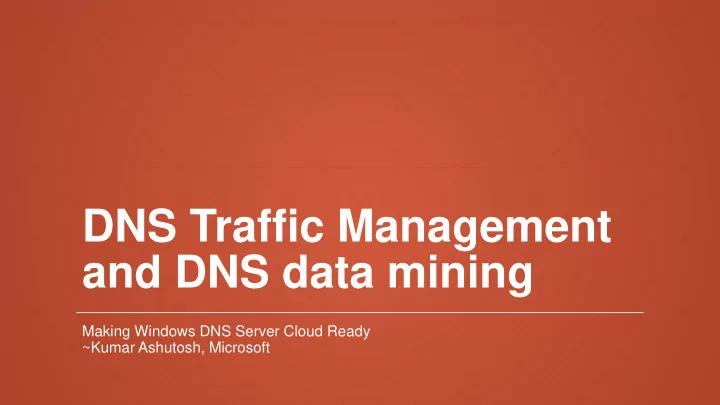

DNS Traffic Management and DNS data mining Making Windows DNS Server Cloud Ready ~Kumar Ashutosh, Microsoft
Windows DNS Server ▪ Widely deployed in enterprises ▪ Fair presence in the DNS resolver space ▪ Standards compliant and interoperable ▪ Secure and scalable
Needs of DNS server in cloud ▪ Policy based traffic management ▪ Audit and billing mechanism for DNS service ▪ The DNS data mine and analytics ▪ Security and High availability
Policy based Traffic Management ▪ DNS Policy is Windows DNS Server construct that allows DNS administrators to control the DNS Query processing in order to achieve : ▪ Global Traffic Management, ▪ Application Load Balancing, ▪ Intelligent DNS responses based on communication protocol (IPV4 or V6) or transport protocol (UDP and TCP), ▪ Applying tenant specific filters for black holing, parental control etc. ▪ Split-Brain DNS Deployment … and much more
Anatomy of a policy Any combination of Client Subnet, Server Interface IP, FQDN, Internet protocol (IPV4/V6), Transport Protocol (UDP/TCP), Time Of Day, Query Type Criteria ? If policy matches what action to take : ALLOW, DENY, IGNORE Action ? If Action is allow, what data to respond with and in what ratio. Content
Capabilities Location aware responses Time of day based policies Traffic Management Time of day Improve availability of ? critical applications by Split Brain DNS failover policies High Split Brain Availability ? Application Load Balancing based on the performance Black Hole and Filters of host Load Balancing Filters
DNS Audit Trail What Who changed? -For Reporting changed? What? Who? When? -Audit Trails -Zone -DC admin -diagnostics -Server -Tenant admin -Record
DNS Data mine Data Data Pattern Actionable collection Preparation discovery Information
DNS Data mine : Data Collection ▪ Collect data from every DNS server ▪ Centralized system for collection ▪ Real time collection with minimal performance impact ▪ Kinds of Data collected: ▪ All DNS transactions ▪ Queries/responses ▪ XFR ▪ Dynamic updates ▪ Server state ▪ Health indicators ▪ Performance counters
DNS Data mine : Data Preparation ▪ Cleaning the data ▪ Data transformation ▪ Creating relational databases for different purposes ▪ Related calculations – like amplification factor, frequency etc. ▪ Collation of data across the server farm ▪ Correlation of data ▪ Across multiple servers ▪ Between single user ▪ Relationship with state of the server. ▪ Rolling over with knowledge transfer.
DNS Data mine: Pattern Discovery ▪ Domain name analysis, ▪ Amplification analysis ▪ User behaviour analysis ▪ Client subnet analysis ▪ Security analysis
DNS Data mine: Actionable Information ▪ User behaviour analytics ▪ Load model ▪ DDoS detection
Thank You
Recommend
More recommend